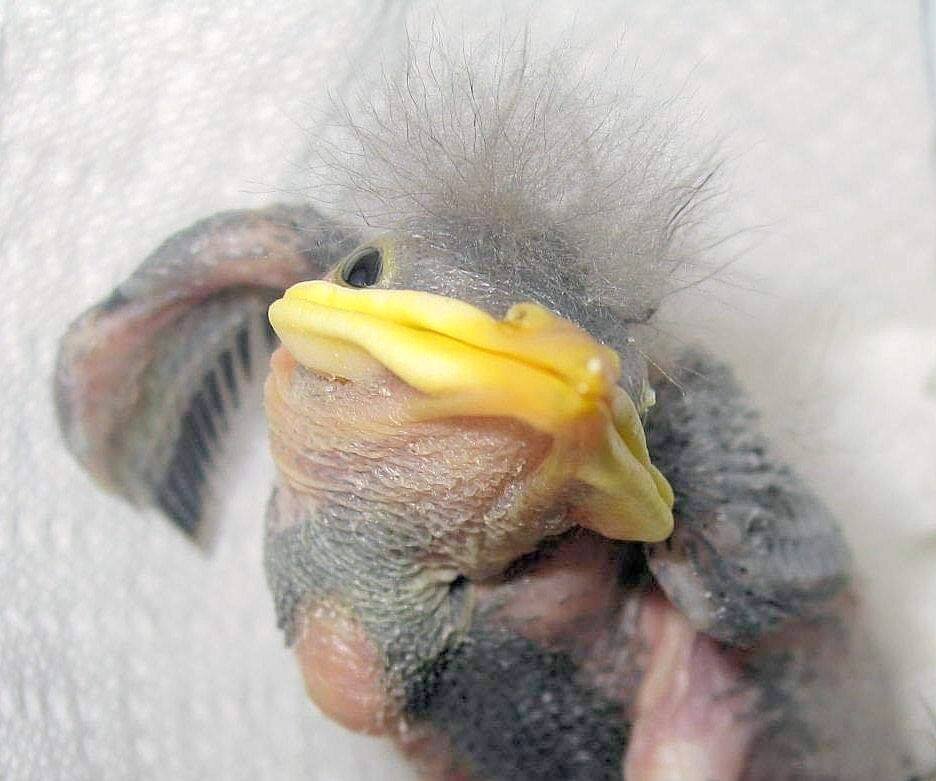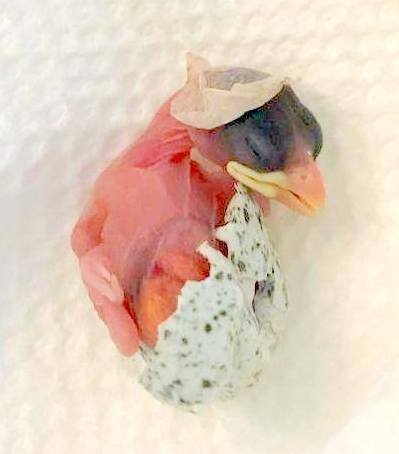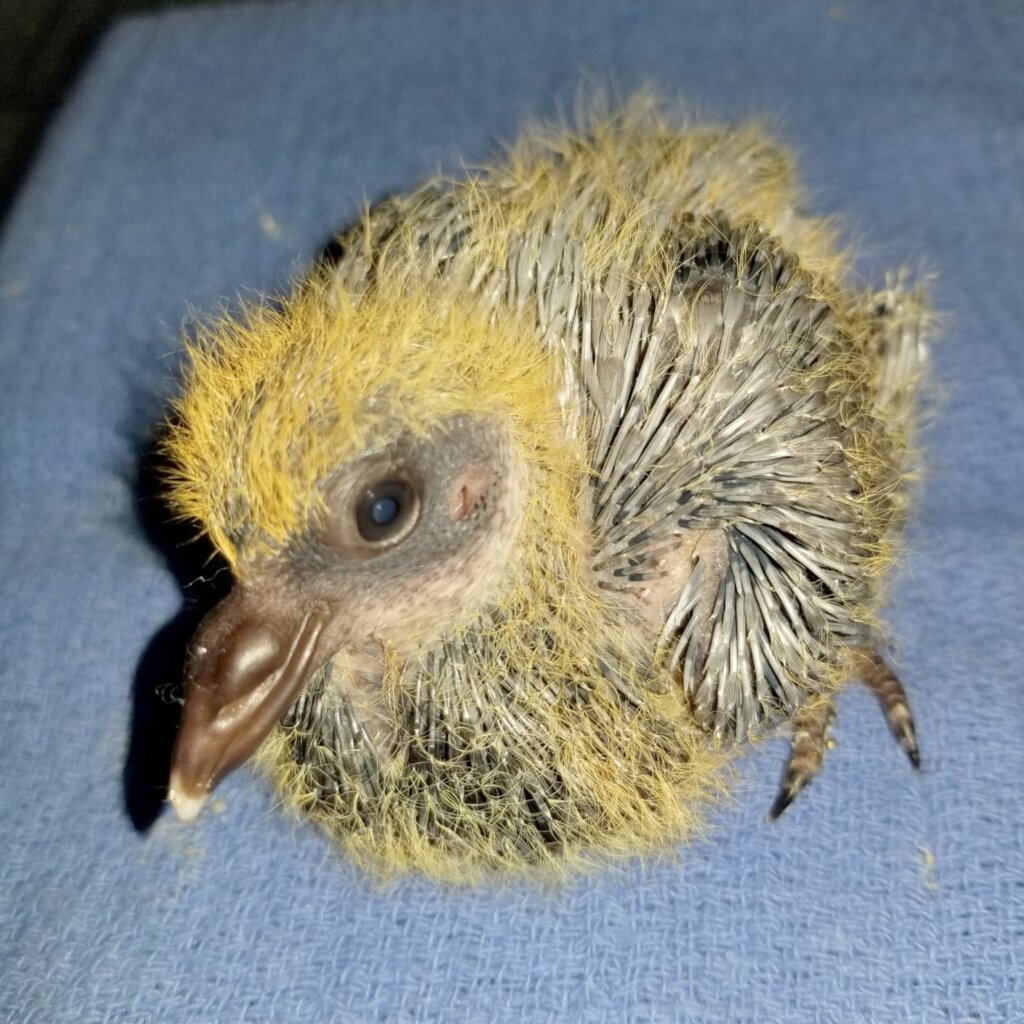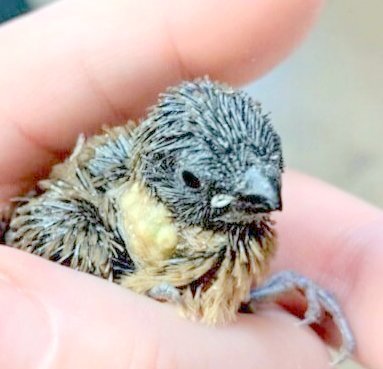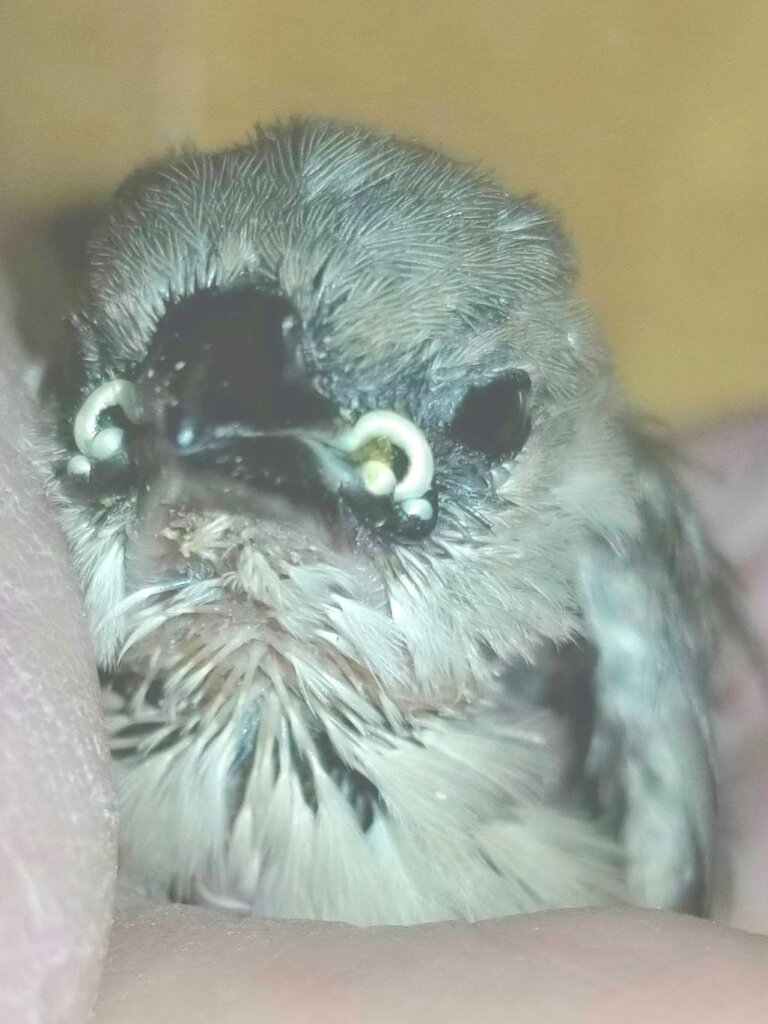![Pogo]()
Pogo
Let’s give a big shout out to our very dedicated volunteers who hand feed and provide life giving care to the many birds that come our way! Thank you Sue, Mary Anne, and Terrie! Heck! Thanks to me too as I am also one of our hands on caregivers. 2021 has been our busiest year yet with over 1,000 birds being assisted between January 1 and September 30 this year. Thankfully, baby season has just about wound down, and we are back to a “normal” amount of incoming birds.
It's not easy doing what we do. It's mentally and emotionally taxing. When things go well, it's joyful and rewarding. When things don't go well, it's devastating and heartbreaking. It definitely isn't for the faint hearted. In addition to tiny hatchling and nestling birds that need to be kept warm and fed every 15-30 minutes daylight until dark until they are older, our caregivers are often faced with birds of all ages that are extremely ill and/or horribly injured. In the case of ill and injured birds, our caregivers have to fill in as emergency medical technicians until arrangements can be made for the birds to be seen by one of our avian veterinarians. A visit to the vet also means that the caregiver most likely has to make the time to take the bird in, pay close attention to the diagnosis and treatment plan, and then take the bird home and implement that plan. Our caregivers have to be jacks of all trades and masters of many!
Let’s take a look at a few of the very special birds that have come in during 2021 and what their caregivers have been faced with.
POGO came to us on September 5, 2021. Pogo was only a couple of days old and was the only survivor of a clutch of three little cockatiels. Pogo’s bird parents were first time parents and didn’t know how to care for Pogo and his siblings. They didn’t keep the babies warm or feed them. Pogo’s siblings died, cold and hungry, before even having a chance at life. Pogo’s parents should not have been allowed to breed and hatch young. The humans involved also had no idea what to do and brought Pogo to us when they realized what had happened. It is a monumental undertaking to raise a hatchling bird, and Pogo’s case was complicated by him having a ruptured air sac that kept filling his tiny body with air under the skin that had to be drained off. Terrie’s dedication and tenacity kept Pogo alive through the very rough early days, and now Pogo is grown, self-feeding, and flying! Pogo has been adopted by Terrie and her family.
TIDBIT is a beautiful Sun Conure that was found by a very kind person who brought her to us for care on August 8, 2021. Tidbit’s upper beak had been almost completely bitten off, she was missing all her tail feathers and many of her wing feathers in addition to having a slight injury and more missing feathers on the head. Tidbit’s beak and injuries were assessed by our avian veterinarian, and it was decided to see how much, if any, of the upper beak would grow back over a period of 4 to 6 months. There has been some regrowth, but Tidbit gave up on trying to eat on her own and has required hand feeding multiple times per day over the past two months. Both Sue and Mary Anne have given Tidbit lots of love, provided hundreds of hand feedings, treated her wounds, given her the medications she needed, and never gave up on her! Tidbit has been staying with Pogo’s Mom, Terrie, for the past couple of days and has shown some interest in eating on her own again. Hurray! Tidbit will continue to need a great deal of love and care over the coming months and will remain with one of our caregivers for the foreseeable future.
CHANCE is a cockatiel that must have the nine lives of a cat! A hawk had Chance in its talons and was spotted flying overhead by several people who witnessed Chance’s plight. By some miracle, the hawk dropped Chance, and Chance somehow managed to still be alive after being in the clutches of a hawk and then being dropped a great distance. Chance’s hawk misadventure happened on July 25, 2021.
Chance was severely injured and required a great deal of veterinary care and medication over the past almost 3 months. She is finally healed and ready to go to her adoptive family. Mary Anne persevered with having to provide daily medication for Chance’s wounds, numerous trips to the veterinarian for rechecks and refills, and seemingly endless worry about Chance bleeding out when the wound under her wing continued to reopen. In addition to all this, Chance went through several episodes of extreme and rapid weight loss that had to be compensated for by supplemental hand feeding. Mary Anne never missed a beat and never gave up on Chance.
ELLIOTT is an elder Lutino lovebird that came into our care on August 31, 2021 exhibiting extreme neuro symptoms. Elliott is believed to be at least 20 years old. In a way, Elliott is the epitome of a grumpy old man, but underneath that gruff exterior is an absolute sweetheart of a bird. Elliott belonged to someone who had to move out of state and who chose not to take Elliott along. Elliott was put in the care of an extremely kind and caring young lady who did her best to find out what is wrong with Elliott and help him. She took Elliott to her veterinarian, but no conclusive cause for his neuro behavior was determined. Having exhausted her financial resources for helping Elliott, she turned to us for help, and we gladly took Elliott in. We took Elliott to our avian specialist, and it was quickly determined that Elliott’s gizzard had numerous foreign bodies in it that were too large to pass through his intestines. Elliott was put on 30 days of chelation therapy and rechecked. Sadly, foreign bodies remained in his gizzard. Because Elliott’s neuro symptoms lessened during chelation therapy, it was concluded that the foreign bodies were metal and were releasing toxins into his system. Blood work had already been done and there were negative results for zinc or lead, but clearly, there was and is some type of metal in there. Elliott is now back on another round of chelation, and we will see where we are when that is complete. Elliott is and has been in my care.
OTHER BIRDS The last two pictures are of just a few of the many, many other birds we have taken in during 2021 thus far. I, personally, take the pigeons, doves, and quail as well as many of the baby non-native birds. Each and every one of us had literally dozens and dozens and dozens of baby birds during the height of baby season. Truly, this is a labor of love for all of us!
I’m sorry for a lengthy report, and thank you for reading it! We are grateful for your support! Just Pogo, Tidbit, Chance, and Elliott that are mentioned in this report required several thousand dollars in veterinary costs to help them get better. We desperately need your financial support in order to continue helping the birds. Thank you in advance for donating! Please keep us in mind for Giving Tuesday, November, 30! There are matching funds available!
![Tidbit]()
Tidbit
![Chance]()
Chance
![Elliott]()
Elliott
![Doves, Pigeons, and Quail]()
Doves, Pigeons, and Quail
![Japanese White Eyes, Starling, Sparrows, Finch]()
Japanese White Eyes, Starling, Sparrows, Finch
![Share on Twitter]()
![Share on Facebook]()
